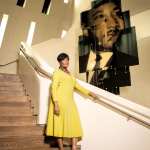This collection, Portraits of a Pandemic, is a co-production between The Philadelphia Inquirer and The 19th. This work is supported by the Pulitzer Center and The Lenfest Institute.
This interview has been edited for length and clarity.
How are you doing? How has this pandemic affected you personally?
I have two kids in college, one in Georgia and one in California. I had to scramble like other parents and get them out of their housing and to somewhere safe. I was able to fly my oldest son [in Georgia] here, but because stay-at-home orders were enacted in California, I haven’t seen my youngest son in person since all of this hit.
Obviously I’m running an organization here, but I’m still Mom when I go home.
What are the challenges of providing law enforcement in a pandemic?
[Prior to coronavirus, the police department] had shifted back to a very community-oriented focus. A lot of the work that we do involves close-quarter contact, attending meetings in person.
When the pandemic hit, I was 30 days in, and all of the things I was doing — being out and about in the community — came to a screeching halt.
We also had to come up with protocol on how to continue to do our job. Crime is not going away. Our lower-level crimes are going down, but some of our crimes, our shootings and homicides, have gone up. We’re working within this cloud of this silent killer that no one can see.
While it’s really easy for me to [tell officers], “I need you to go out here and do A, B and C,” in the back of my mind I know that we’re still struggling to get proper [personal protective equipment] to get out here to these folks so they can do it safely. So that’s another balancing act. We’re having to quickly find other ways to engage folks or go hands-on when we need to, but make sure we do it safely.
We had to prioritize who we choose to interact with when it comes to enforcement. I caught some flak for it early on in the pandemic, but we modified our arrest protocols for lower-level crimes. I needed to make sure my folks were safe. We didn’t know what was about to come. If it’s something we can come back and address another day, we will do that. But also, several of the courts had closed. So there wasn’t even the capability to process those folks without overcrowding the prison. We’re the entryway to the criminal justice system. There were so many other parts of the system that were impacted that dictated how we did business as well.
How are public health and law enforcement related?
Whenever a new order comes out, whether at the state level or the city level, my question is, “Who’s going to enforce that? Are the police being put in an unfair predicament of being expected to enforce the unenforceable?”
Like what?
Like if the weather gets nice, and you’ve got tons of people who decide to go chill along the river without practicing proper social distancing. Or, early on, there was a basketball game at a park where Parks & Rec hadn’t gotten to that park yet to take the rims down. There were kids out there, and they all had masks on, but they were playing basketball. So we went out there, we asked them to leave, and eventually they did. But some people were upset that we didn’t do more, that we didn’t use physical force to make people leave.
Early on we had people calling the police saying, “They weren’t wearing a mask.” We’re not responding solely because someone’s not wearing a mask. But we’re being placed in these positions to take enforcement actions for a public health matter. We push back and say, “Optically it makes us out to be the bad guys. Is there another way that we can push for personal accountability without involving the police?” So that’s been a really tough conversation that we’re seeing, and it’s not only us that’s dealing with it.
What are you hearing from your female officers about the challenges that are unique to them? Childcare? Other caregiving?
If they can work from home, we need them to work from home. My concern is when it’s time to slowly start bringing people back in and daycares aren’t open yet, what that looks like. We’re trying to plan to make sure that those [openings] are concurrent, because we know that’s an issue. There’s a lot of law enforcement families in the department that may share responsibilities. It’s absolutely a priority.
You’re one of only a handful of female police commissioners in the country, and the first Black woman to lead Philadelphia’s police department. Our city has a plurality of African Americans, and we know that Black people are being disproportionately impacted by coronavirus. How do both your lived experience and the racial realities of this virus inform how you think about your job now?
It pains me that some residents don’t have access to masks. So I’ve been carrying around some in the back of my car and I pass them out.
It’s one thing to say, “socially distance. If you do come out, wear a mask.” But everybody doesn’t even have a mask. And that’s my community, so I think about stuff like that. I can’t say “You called 911 but I’m not talking to you because you don’t have a mask” without offering it to you. It’s just little things that you don’t think of until the situations arise.
I carry a lot of perspectives on my shoulders, and I have a lot of lived experiences because I wear various hats. There’s the law enforcement piece and, you know, I’m a Black woman. So when I’m driving, when I’m out and about, everybody I see, they look like somebody that could be related to me.
You have two sons. Have you talked to them about the Ahmaud Arbery or the Breonna Taylor case? What does it mean that some Black Americans are feeling unsafe in the midst of this pandemic?
We’ve had these conversations long before the pandemic and they’ve never felt uncomfortable sharing their experiences, and vice versa. They need to know this is the world. They’re 22 and 19. We tell them: Don’t live in fear, but just know that everybody isn’t going to be welcome to you. I’m glad that they’re safe even though I don’t have both of them here with me. When they were very young boys, we had conversations with them about the police — and both of their parents are cops — how to interact with the police, what to do when you’re stopped by the police, how some people in the world view them as young Black men. I don’t shelter them from any of that.
Are you concerned about an increase in gun violence? In domestic violence? Are these things you’ve seen since the stay-at-home order has been in place?
We’ve been tracking both of those, actually. We’ve seen an increase in our homicides and shootings. We have not seen a significant increase in domestic violence incidences or child abuse. That doesn’t mean there’s not underreporting taking place.
Has the pandemic changed how you look at your job as commissioner? What do you think needs to change on the other side of this?
I don’t know if my role as commissioner has changed, but I will tell you working through a pandemic is a job in itself, full time. So this is just an added layer to all the things I’m doing on a day-to-day basis.
It’s crisis management, whether it’s an earthquake or fires or whatever. Working in crisis isn’t anything new for a police commissioner; this is what we do, and quite frankly, I don’t know if this is a good or bad thing, but this is where we thrive.







